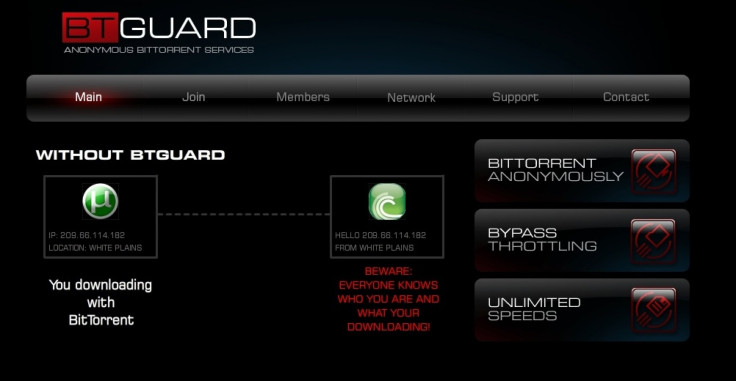'BT Guard' Proxy Increasingly Popular With BitTorrent Users Hiding From Approaching 'Six Strike' Policy

Many who illegally download BitTorrent files have been forced to changed their habits due to increased pressure from the U.S. Dept. of Justice and the new "six strike" policy that will be put into place by major Internet service providers this year.
Some have chosen to set up their own virtual private network to hide their traffic, and others have quit BitTorrenting files altogether. Now, BT Guard, a simple proxy service, has quietly found its own audience.
Copyright enforcers like the MPAA and RIAA have always planted fake, tracked torrent files online in the hope that people will download them and reveal their own IP address, making them ripe for a lawsuit.
The new six strike policy, to be enacted in late November, will now have the Internet service providers, or ISPs (Time Warner, Comcast, Verizon, Cablevision, AT&T), do their bidding. The companies that provide customers with Internet access will now monitor individual networks for excessive bandwidth use, which is usually caused by downloading large files (e.g., movie torrents).
When someone downloads a torrent file, he or she connects to other computers, located anywhere in the world, that are trying to do the same thing. As a result, every user using a torrent service runs the risk of revealing their IP address and other information to a party that might be hired by the MPAA or RIAA.
That’s where BT Guard comes in. The proxy service is compatible with major torrent clients like uTorrent and Vuze and can run on either Mac or PC systems.
It costs $6.95 each month, and it provides users security from snooping third parties and ISPs that like to throttle connections -- and throttled connections is a major component of the six-strike policy. Lifehacker points out that the relatively low price for this service is little compared to the potential of a lawsuit from a major company.
The easiest way to picture how BT Guard works is a triangle. Instead of linking his or her connection directly to a file, BT Guard customers will have their computer rerouted through an IP address in Canada or Europe. The location matters less than the specifics of the IP number, as any MPAA hired-gun will likely end up be chasing a false lead somewhere in Germany as a result of the service -- which is reassuring to anyone illegally downloading a copy of “The Avengers” in, say, Wisconsin.
Setting up BT Guard is easy, but the reviews have been, well, mixed. Discussions on Reddit often stem from customer frustration with slow download speeds or are have headlines like “Is BT Guard a scam?” The online criticism really mounts when customers who have paid their monthly fee (which is cheaper when someone signs up for more than one month at a time) find out through third-party sites that the network is down, exposing the legal and illegal activity they wanted to keep anonymous.
Also popular are seed boxes, which require a user to sign up with a service in another country that essentially does the dirty work for them.
Now, with downfall of Demonoid and more heat on illegal sites, BitTorrent users might not have many other options.
© Copyright IBTimes 2024. All rights reserved.





















